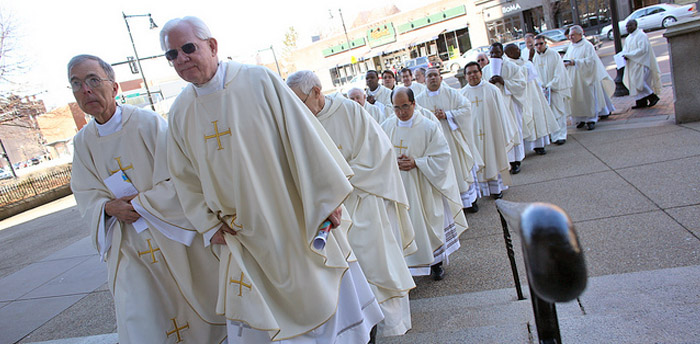By Fr. Shenan J. Boquet
I received a number of e-mails from friends after Respect Life Sunday saying that they heard little, if anything, about life and family from the pulpit. It is as if some pastors are afraid of preaching the gospel of life, or have something more important to talk about even when it is chosen as the day to preach on precisely these issues.
The failure to preach the gospel of life is not only a U.S. problem. During HLI’s conferences, I hear the same comments from around the world. I bring this up when I speak to seminarians, priests, and bishops—many times the only message the faithful will hear about these incredibly urgent pastoral and moral questions is at Mass.
Generally, Catholics might hear a homily on abortion once a year. They might hear an occasional reference to euthanasia—a subject some deem easier to preach about—but most usually never hear references to contraception, homosexuality, promiscuity, pornography, cohabitation, or divorce.
It is also not helpful when Church leaders accept the false caricature that “the Church is always talking about these issues,” so it’s about time we talked about something else. Apparently “the Church” has not sufficiently talked about issues in a way that helps the political party that now treats abortion as a “human right.”
When one cardinal said two years ago that those Catholics who were in second civil unions without annulment of their marriages should not be expected to be heroes by being celibate, many couples who had been abstaining from sex felt like they had been punched in the gut. What had they been sacrificing for? Such a position makes it sound like Jesus’ teaching on marriage is just too hard to follow. We know better than Jesus. We are more pastoral. It is even more hurtful when the cardinal’s superior also seems to accept and repeat this characterization of Church teaching as being uncompassionate.
It is true that priests and bishops are people too. When they preach in a way that displeases people not only might they lose parishioners, they may also lose collection revenue and invite nasty e-mails and face-to-face conversations after Mass. Most of us know the risks too well.
But, my brothers, we have given our lives to a Man who submitted to a gruesome and humiliating death! We follow Our Lord, who died on a cross for us! If we love those whom we are given to serve in our parishes—let me choose my words carefully here—how the hell are we helping them if we do not tell them the truth—the Good News—about sexuality and marriage? These are pastoral issues, and cannot be reduced to some obscure teaching that was meant for another time! Pope Saint John Paul II knew this well:
The Gospel of life is at the heart of Jesus’ message. Lovingly received day after day by the Church, it is to be preached with dauntless fidelity as “good news” to the people of every age and culture. (Evangelium Vitae 1)
My God, my God, why have we forsaken you? How did we let ourselves come to the belief that you, Our Lord, meant for our lives to be as easy as possible? That Your Law—what You told us is what those who love you will follow—can only be held up when it happens to find agreement with our fallen culture?
Why are we not protecting married couples from the violence of contraception—the divorce of unitive and procreative aspects of the beautiful gift of sexuality? Why are we afraid of helping our brothers and sisters to live in truth, according to their dignity?
What is our role and duty in Christ—in truth and charity?
No one has said that we must only preach about life and family issues. Anyone who claims differently is ignorant or is trying to manipulate the listener. As priests we must prayerfully discern how to bring the Word of God directly to those we serve in a way that they can hear. We absolutely must remind the faithful of their obligation to serve in solidarity with those in need, to be generous with their material gifts. We owe it to our congregations to remind them of the goodness of Truth and Beauty—the goodness of life, of God’s creation and our responsibility to be stewards of what we’ve been given. We have to remind people that our faith cannot be reduced to rules, but is based on Love.
But we must never accept the false representation of Church teaching on life and marriage as lacking compassion, or pretend it was made for another time. We must not be afraid to tell the truth about life and family, as there are no more immediate or urgent pastoral issues that our families are dealing with at home or in the public square.
Preaching on these issues on Respect Life Sunday is a bare minimum—a starting point. We are forming hearts and minds so that the faithful can in freedom choose wisely and lovingly when the moment of heroism—even everyday heroism for those with great challenges—comes their way. It is not “pastoral” to ignore the loving doctrine we have been given and offer solutions that soothe and confuse. This is not love.
Father Shenan J. Boquet is the president of Human Life International. He has traveled around the world spreading the gospel of life. Father Boquet is a priest of the Houma-Thibodaux Roman Catholic Diocese in Louisiana, his home state, where he served before joining Human Life International in August 2011.
This article has been reprinted with permission and can be found at http://www.hli.org/2015/11/why-are-we-afraid-to-tell-the-truth/.
